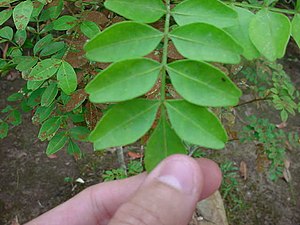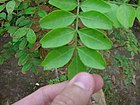Note: This is a project under development. The articles on this wiki are just being initiated and broadly incomplete. You can Help creating new pages.
Difference between revisions of "Pilocarpus microphyllus"
(Created page with "{{stub}} ==Uses== {{Uses|}}, {{Uses|}}, {{Uses|}}, {{Uses|}}, {{Uses|}}, {{Uses|}}, {{Uses|}}, {{Uses|}}, {{Uses|}}, {{Uses|}}, {{Uses|}}.<ref name="Uses"/> ==Parts Used== {{...") |
|||
| (One intermediate revision by the same user not shown) | |||
| Line 1: | Line 1: | ||
| − | + | [[File:Jaborandi.JPG|thumb|right]] | |
| + | '''Pilocarpus microphyllus''' is an evergreen shrub or small tree branching from low down. It grows 3 - 7 metres tall. An alkaloid isolated from the plant is commonly used in conventional medicine - the plant being gathered from the wild for this purpose. The leaves are also commonly used in herbal medicine. | ||
==Uses== | ==Uses== | ||
| − | {{Uses|}}, {{Uses|}}, {{Uses|}}, {{Uses|}}, {{Uses|}}, {{Uses|}}, {{Uses|}}, {{Uses|}}, {{Uses|}}, {{Uses| | + | {{Uses|Epilepsy}}, {{Uses|Convulsions}}, {{Uses|Gonorrhoea}}, {{Uses|Fever}}, {{Uses|Influenza}}, {{Uses|Pneumonia}}, {{Uses|Gastrointestinal inflammations}}, {{Uses|Kidney disease}}, {{Uses|Psoriasis}}, {{Uses|Neurosis}}.<ref name="Uses"/> |
==Parts Used== | ==Parts Used== | ||
| Line 7: | Line 8: | ||
==Chemical Composition== | ==Chemical Composition== | ||
| − | <ref name="chemical composition"/> | + | It contains alkaloids derived from L-tryptophan were also isolated from Pilocarpus species. Some examples are N,N-dimethyl-5-methoxy-triptamine (10) and N,N-dimethyl-triptamine (11) (known as DMT) obtained from P. organensis leaves; both have a CNS activity causing hallucinations.<ref name="chemical composition"/> |
==Common names== | ==Common names== | ||
| Line 16: | Line 17: | ||
===Dravya=== | ===Dravya=== | ||
===Rasa=== | ===Rasa=== | ||
| − | |||
===Guna=== | ===Guna=== | ||
| Line 29: | Line 29: | ||
==Habit== | ==Habit== | ||
| − | {{Habit|}} | + | {{Habit|Evergreen shrub}} |
==Identification== | ==Identification== | ||
| Line 48: | Line 48: | ||
==Mode of Propagation== | ==Mode of Propagation== | ||
| − | {{Propagation|}} | + | {{Propagation|Seeds}} |
==How to plant/cultivate== | ==How to plant/cultivate== | ||
| Line 58: | Line 58: | ||
==Photo Gallery== | ==Photo Gallery== | ||
<gallery class="left" caption="" widths="140px" heights="140px"> | <gallery class="left" caption="" widths="140px" heights="140px"> | ||
| − | + | Jaborandi.JPG | |
</gallery> | </gallery> | ||
| Line 64: | Line 64: | ||
<references> | <references> | ||
| − | <ref name="chemical composition">[ | + | <ref name="chemical composition">[https://www.scielo.br/scielo.php?script=sci_arttext&pid=S1516-93322004000200002 on Chemical constituents]</ref> |
| − | <ref name="Leaf">[ | + | <ref name="Leaf">[Morphology]</ref> |
| − | <ref name="How to plant/cultivate">[ | + | <ref name="How to plant/cultivate">[Cultivation]</ref> |
<ref name="Uses">Indian Medicinal Plants by C.P.Khare</ref> | <ref name="Uses">Indian Medicinal Plants by C.P.Khare</ref> | ||
</references> | </references> | ||
==External Links== | ==External Links== | ||
| − | * [ ] | + | * [https://www.homeopathycenter.org/remedy/pilocarpus-microphyllus Pilocarpus microphyllus on homeopathycenter.org] |
| − | * [ ] | + | * [https://journals.plos.org/plosone/article?id=10.1371/journal.pone.0170281 Pilocarpus microphyllus on journals.plos.org] |
| − | + | ||
[[Category:Herbs]] | [[Category:Herbs]] | ||
| + | [[Category:Pages without herbs images]] | ||
Latest revision as of 12:48, 2 July 2020
Pilocarpus microphyllus is an evergreen shrub or small tree branching from low down. It grows 3 - 7 metres tall. An alkaloid isolated from the plant is commonly used in conventional medicine - the plant being gathered from the wild for this purpose. The leaves are also commonly used in herbal medicine.
Contents
- 1 Uses
- 2 Parts Used
- 3 Chemical Composition
- 4 Common names
- 5 Properties
- 6 Habit
- 7 Identification
- 8 List of Ayurvedic medicine in which the herb is used
- 9 Where to get the saplings
- 10 Mode of Propagation
- 11 How to plant/cultivate
- 12 Commonly seen growing in areas
- 13 Photo Gallery
- 14 References
- 15 External Links
Uses
Epilepsy, Convulsions, Gonorrhoea, Fever, Influenza, Pneumonia, Gastrointestinal inflammations, Kidney disease, Psoriasis, Neurosis.[1]
Parts Used
[[:Category:Herbs with used in medicine|]], stem, leaves, Root.
Chemical Composition
It contains alkaloids derived from L-tryptophan were also isolated from Pilocarpus species. Some examples are N,N-dimethyl-5-methoxy-triptamine (10) and N,N-dimethyl-triptamine (11) (known as DMT) obtained from P. organensis leaves; both have a CNS activity causing hallucinations.[2]
Common names
| Language | Common name |
|---|---|
| Kannada | |
| Hindi | |
| Malayalam | |
| Tamil | |
| Telugu | |
| Marathi | |
| Gujarathi | |
| Punjabi | |
| Kashmiri | |
| Sanskrit | |
| English |
Properties
Reference: Dravya - Substance, Rasa - Taste, Guna - Qualities, Veerya - Potency, Vipaka - Post-digesion effect, Karma - Pharmacological activity, Prabhava - Therepeutics.
Dravya
Rasa
Guna
Veerya
Vipaka
Karma
Prabhava
Habit
Identification
Leaf
| Kind | Shape | Feature |
|---|---|---|
Flower
| Type | Size | Color and composition | Stamen | More information |
|---|---|---|---|---|
| {{{5}}} |
Fruit
| Type | Size | Mass | Appearance | Seeds | More information |
|---|---|---|---|---|---|
Other features
List of Ayurvedic medicine in which the herb is used
Where to get the saplings
Mode of Propagation
How to plant/cultivate
Commonly seen growing in areas
[[:Category:Herbs that are commonly seen in the region of |]], [[:Category:Herbs that are commonly seen in the region of |]], [[:Category:Herbs that are commonly seen in the region of |]], [[:Category:Herbs that are commonly seen in the region of |]], [[:Category:Herbs that are commonly seen in the region of |]].
Photo Gallery
References
- ↑ Indian Medicinal Plants by C.P.Khare
- ↑ on Chemical constituents
- ↑ [Morphology]
- ↑ [Cultivation]
External Links
- Ayurvedic Herbs known to be helpful to treat Epilepsy
- Ayurvedic Herbs known to be helpful to treat Convulsions
- Ayurvedic Herbs known to be helpful to treat Gonorrhoea
- Ayurvedic Herbs known to be helpful to treat Fever
- Ayurvedic Herbs known to be helpful to treat Influenza
- Ayurvedic Herbs known to be helpful to treat Pneumonia
- Ayurvedic Herbs known to be helpful to treat Gastrointestinal inflammations
- Ayurvedic Herbs known to be helpful to treat Kidney disease
- Ayurvedic Herbs known to be helpful to treat Psoriasis
- Ayurvedic Herbs known to be helpful to treat Neurosis
- Herbs with used in medicine
- Herbs with stem used in medicine
- Herbs with leaves used in medicine
- Herbs with Root used in medicine
- Habit - Evergreen shrub
- Index of Plants which can be propagated by Seeds
- Herbs that are commonly seen in the region of
- Herbs
- Pages without herbs images

